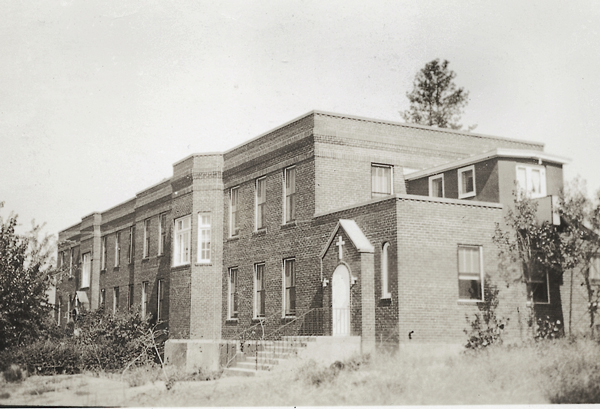Crowded, outdated and struggling, St. Charles Hospital had appealed to the community for help. The evening of March 10, 1948, community leaders responded en masse.
“They had all the churches, all the organizations—about 150 to 200 people up at the old Pilot Butte Inn,” recalled Lowell Jensen a long-time St. Charles board member.
On the table was whether to build a new hospital or add to the existing one and how to pay for either. The Sisters of St. Joseph couldn’t afford a new one at an estimated cost of $1 million. In 1946, they had tried unsuccessfully to sell it to another religious order because of financial troubles. It was up to the citizens of Bend to help what many had begun to regard as “their” hospital. What happened in the following months remains an example of what ordinary citizens could accomplish in a small town.
“The (sisters) were working for free and never really got enough money to go and build anything, so we’d have to go out and raise the money. With that story, it wasn’t hard. The community has always been part of the hospital and still is,” said Pat Metke, another former [Missing copy…(board member?)]
The hospital had run on a meager budget since the sisters assumed operations in 1918. When people couldn’t pay their bills, the sisters would accept farm goods in payment. Some bills were simply forgiven, according to Jensen and Metke, something that holds true even today.
By 1946, crowding had become a problem even with the 25-bed military annex the government had sold the sisters. Bend was surging toward 12,000 people and in 1946 the 60-bed hospital admitted 2,500 patients. That number would hit 3,113 by 1949. In addition, the heating, water and lighting in the old brick building were insufficient.
Sister Blanche, the hospital’s superior, first sought the city’s help. She then asked the Bend Chamber of Commerce to step in. That group made building a new hospital its priority and called the Pilot Butte Inn meeting. From this sprang a group that met each morning to plan strategy. Bend had qualified for aid under the federal Hill-Burton Act of 1946, which provided money to modernize hospitals neglected during the Depression and war.
Robert W. Sawyer, editor and owner of the Bend Bulletin, asked Hardy Myers of the Shevlin-Hixon Company and Morris Hitchcock, owner of Wholesale Bend hardware, to go over the hospital’s finances.
“About the third morning (Myers) hit the table and said ‘by God, I don’t know how that woman has kept the doors open,’” Jensen said, adding delinquent bills were one of the problems. “He said it’s a lot of the people right down here on Wall Street that owe her the money and she can’t collect it from them.”
Myers and Hitchcock collected delinquent payments and suggested a board be formed to handle the hospital’s finances.
“Well, they presented that to Sister Blanche and she was delighted to no end. She said ‘Now we can do what we were sent out here to do: nurse the sick,’” Jensen said.
The Central Oregon Hospitals Foundation formed in April 1948 to oversee the hospital’s finances and to spearhead construction. Sawyer was president and Carl A. Johnson was chairman of the fund-raising campaign. They predicted they could raise the needed money in two weeks, Jensen said. Initially fund-raising was brisk. In addition, the group learned the Sisters of St. Joseph could borrow more than $200,000 toward the project. Then progress stalled, and for several months they were $40,000 short of their goal.
“John Wetle came to our meeting one morning and said ‘I raised the $40,000 last night. I got eight fellows to give $5,000 apiece and take a note from the sisters,’” said Jensen. The men later donated the money.
That fall, the Oregon State Board of Health approved a $309,000 grant of Hill-Burton Act money. Combined with the $344,000 the community raised and about $250,000 the sisters borrowed, the money was enough to build the new St. Charles Memorial Hospital.
On Feb, 1950, the Bend High School band led the community through the slushy streets of downtown to Hospital Hill on Franklin Avenue. The new hospital would be built next to the old brick one on the same site. In the ground-breaking ceremony, Sawyer spoke of when St. Charles would be a regional medical center.
“Over 1,900 persons have contributed to this hospital project. There have been large gifts and small and many in between. Whatever the size, every donor will look up at the building that will stand here and take equal pride that he had a part in it,” Sawyer said.
The new hospital was completed the spring of 1951 and dedicated on a stormy May 12, 1951. Sister Blanche spoke after Sawyer cut the ribbon.
“This ribbon will not be needed, for the doors of St. Charles shall never be locked against anyone in need of services, regardless of rank, color or creed,” Sister Blanche said.


